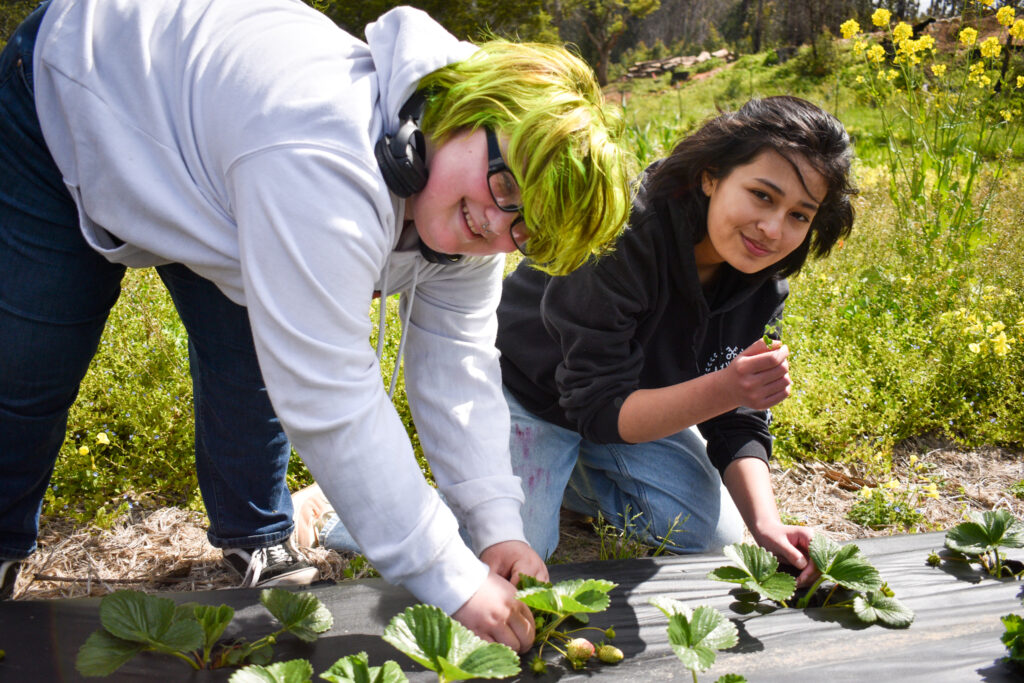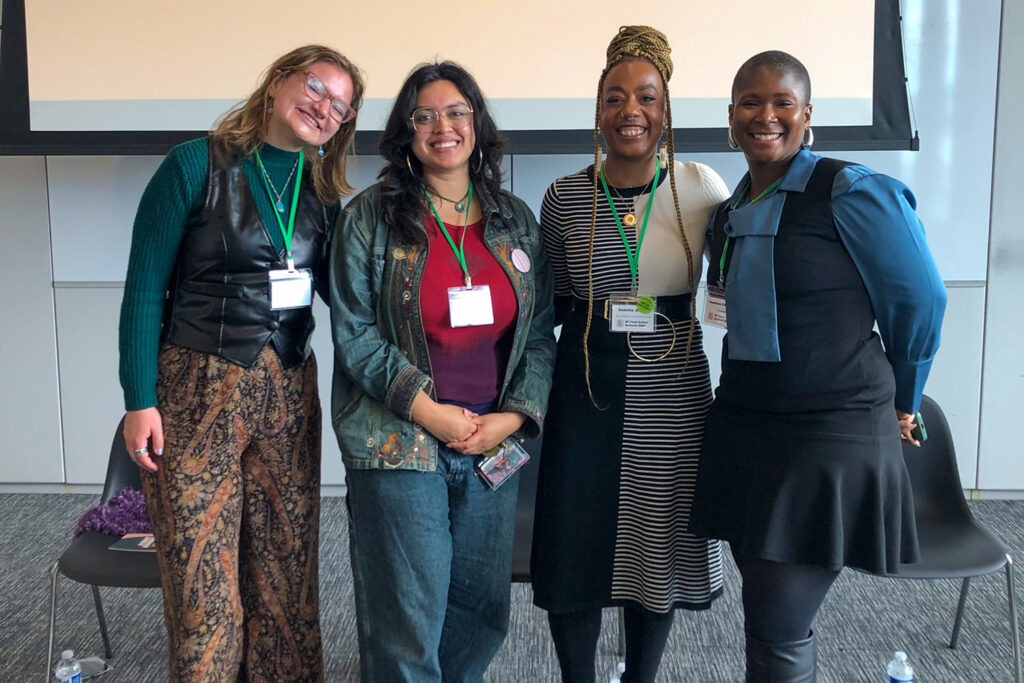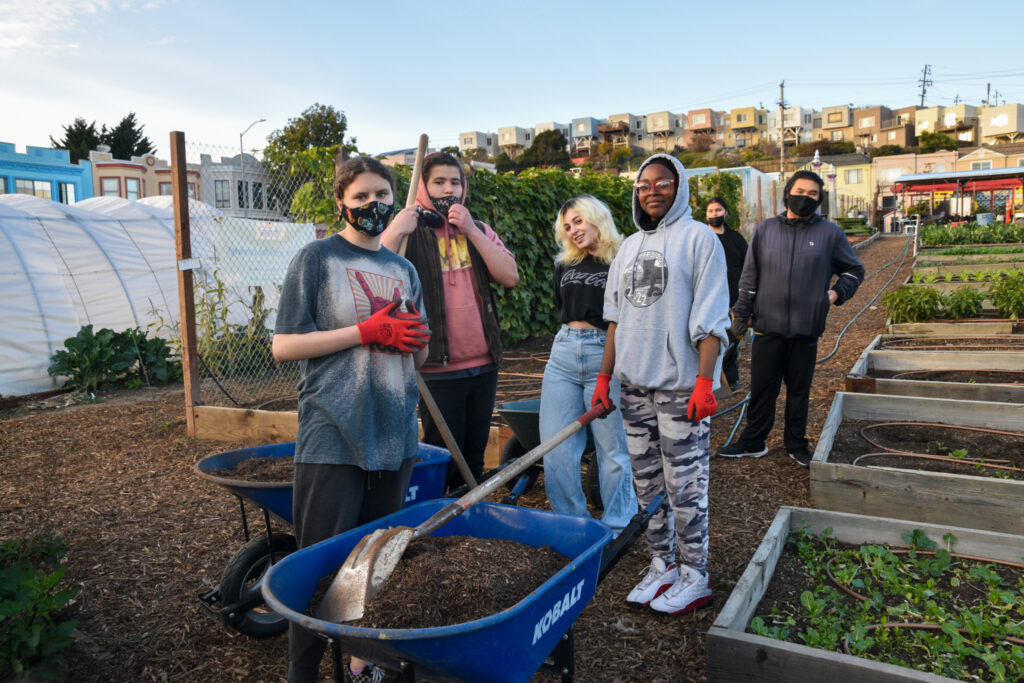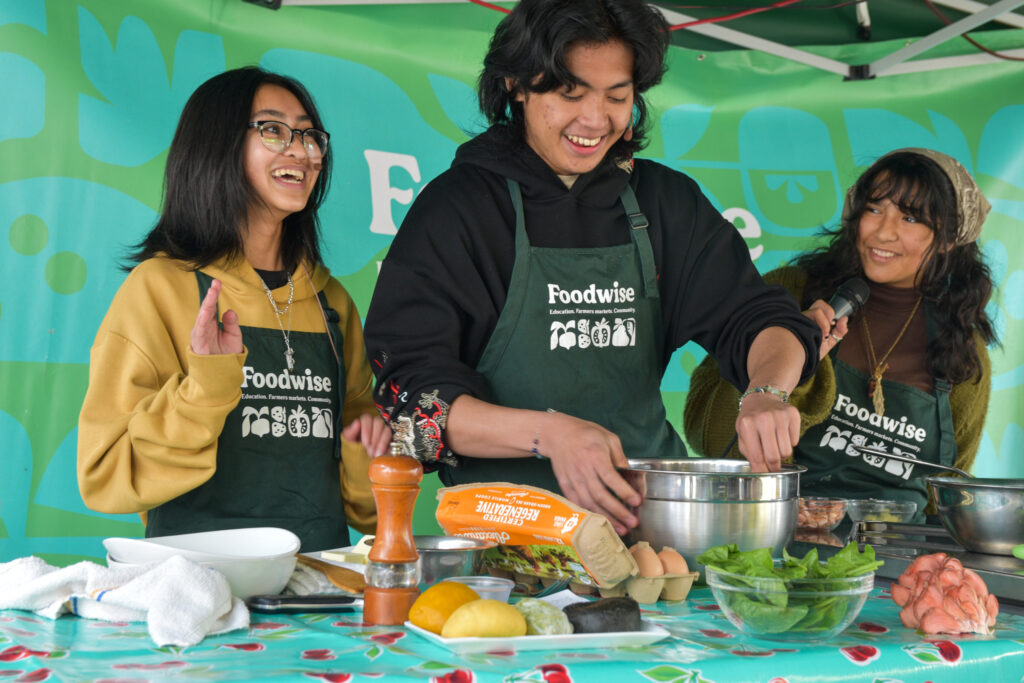Liberation Leaders: Strategies from Bay Area Educators to Engage Youth in Food and Climate Advocacy
Selina Knowles, Communications Coordinator
April 5, 2024

Think back to a time in your youth when you felt comfortable standing up for something you believed in. What about that space made you feel comfortable? When you were given a chance to practice your autonomy, how did the people around you show up for you?
When surveyed about their attitudes toward climate change, more than half of youth across the globe said that “humanity is doomed,” and three-quarters said that the future is frightening. Youth perspectives and actions are shaping the future of our climate and food systems, so it’s essential that they are empowered with confidence, knowledge, and community support to thrive.
In the Bay Area, youth educators are making this happen by creating spaces where students can grow and collaborate. At the inaugural San Francisco Food Action Summit last month, food leaders from dozens of Bay Area organizations came together to discuss solutions for advancing a good food system. Youth educators from Foodwise and CommunityGrows presented on a panel discussion, “Liberation Leaders: Youth as Good Food Champions.”
These educators shared strategies to engage and mentor youth leaders, and described what it looks like to provide the support youth need to advocate and organize within our food system and beyond.

Closing the Gap Between Youth and Their Food
The food system that young people are inheriting is broken. It is characterized by large distances between our farms and our tables, with fresh produce traveling over 1,500 miles from harvest to consumption. Industrial agriculture relies heavily on synthetic fertilizers and pest-resistant chemicals. Approximately 60% of the American diet comes from processed foods, and only one in ten adults are consuming the national recommended fruit and vegetable intake.
“It is extremely important to not sugarcoat the situation at hand,” says Jasmine Chastine, Education Manager for the Foodwise Teens program. “Our water supply, health of the soil, and the vitality of earth is at risk. Naming the problem, and those causing the issues, empowers youth with awareness to then act and make change.”
The Foodwise Teens program is a 10-week paid after-school program where high school students learn about our food system and the impact they can make within it. Students explore what a healthy and sustainable food system looks like as they steward their school garden, create and prepare recipes, visit the Ferry Plaza Farmers Market, tour local farms, and discuss current events affecting food.
Jasmine emphasizes the importance of closing the gap between youth and their food sources, which could look like bringing a youth in your life to a farm, a farmers market, or a local cooperative grocery store. Most importantly, she encourages us all to engage youth in critical conversations around food while respecting their ideas, perspectives, and experiences, “understanding that they have something to offer us, just as we have things to offer them.”

Creating Spaces Where Students Can Make Change
For youth to become environmentally conscious leaders, they need opportunities to be independent and grow their confidence. “After-school programs bridge the routine of school with home life. This transitional space is a wonderful opportunity for them to make change,” says CommunityGrows Garden and Nutrition Educator Oliv Brown. Within these spaces, Oliv and her fellow educator Marbella Jimenez build on three pillars for empowering youth: autonomy, room to fail, and collaboration.
As an example, Oliv facilitates exploratory tasting experiences and environmental science lessons with K-5 students at Rosa Parks Elementary School. She also teaches weekly gardening and cooking classes at Booker T. Washington Community Service Center.
- Each student plants their own chosen salad greens and harvests them several weeks later, allowing students autonomy to make their own choices and choose their own metrics for success. “To nourish this food connection from an early age is key to nurturing a child’s love for cooking with the seasons and being a changemaker in their food system,” says Oliv.
- Allowing room to fail helps students disconnect their worth from their ability to produce. “Gardens allow kids to slow down and get grounded—dig for worms, smell the flowers, make art, build habitats. Highlighting the joy in making mistakes, rather than producing something perfect empowers them to ‘just be,’” shares Oliv. “The earth will never give you a failing grade,” she adds.
- Finally, encouraging collaboration between students gives them the opportunity to steward something together. In their school gardens, kids can grow their connections with each other as they collaborate to care for the garden and share cultural knowledge and recipes along the way.
During each month of CommunityGrows’ paid internship program for high school students, BEETs (Band of Environmentally Educated Teens), students engage with different food justice and sovereignty topics. They also collaborate with each other on projects about decolonizing food and planting culturally sustaining crops.
When educators utilize these strategies, youth can build their confidence and harness tools for advocacy and organizing. “By providing resources, youth are empowered to become local leaders and make change in their communities.” says Oliv.

Building Tools for Advocacy and Organizing
Also essential to empowering youth, we must understand the world of a child, shaped by their personal experiences, needs, and dreams. Oliv, Jasmine, and Marbella seek to create spaces that are respectful of and caring for youths’ whole selves. In other words, Marbella offers a question inspired by the Zapatistas: How do we make “a world where many worlds fit”?
Marbella shares examples of youth concerns, such as family income, housing, food insecurity, and school grades, as well as what educators can offer, including stipends or wages, resource maps, and critically, mentorship. “These socio-economic issues are complex and do not always have clear answers, but they need to be in the forefront of how we take care of our youth always because it is their daily reality,” they say.
From her experiences working with Foodwise Teens, Jasmine shares, “Many students have been struggling with social anxiety, which can present in a multitude of ways. It can be hard to get them out of their shell and for them to engage comfortably.” Technology can be a helpful tool to meet students where they are at. “Integrating technology into our classroom time has eased the stress for them. In the garden, using plant identification apps helps them connect to the land within their comfort zone.“
Marbella also incorporates lessons on advocacy and organizing into their programming. For example, they created and shared a zine (miniature magazine) called “How to organize an advocacy campaign.” In the zine, they describe steps to organize campaigns with their peers and community toward a particular goal.
“The tools of advocacy and awareness can never be taken away from the students and allow them to go into adulthood with a tool belt of skills and resources,” Jasmine says. “In the Bay Area in particular, we are really blessed with long growing seasons, an abundance of trees and plants to forage, and communities that advocate for healthy, accessible food to their residents. Encouraging students to take pride in and fight for this is extremely important.”
She continues, “Most people know a young person, and it starts with inviting them in and spending time with them, bringing them to the farmers market, buying them a seed starting kit, chatting with them about school lunch, or encouraging them to volunteer.”
Want to help empower youth and other members of your community to connect with fresh food and nature? This Earth Month, sign up to volunteer with Foodwise. Learn more about our individual and group volunteering opportunities.
Topics: Foodwise Teens, Youth
